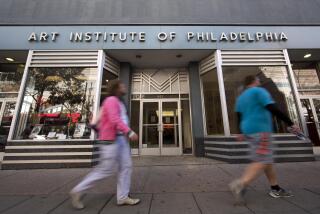Marketing : Allied Gets More Than It Bargained for in Jesse Jackson Advertising Deal : Flap Seen as Public Relations Coup for Costa Mesa Company
- Share via
As Allied Education was preparing its 1987 fall advertising campaign, owner Glenn J. Rodano decided that a celebrity spokesman might be just the thing to boost enrollment at the chain of vocational schools.
The events that followed caused a nationwide flap, providing the little-known Costa Mesa company with exposure far beyond its expectations.
Rodano asked Hal Asher, a Los Angeles advertising executive, to find someone who would appeal to the mostly minority student population at Allied’s 22 schools, which are located from California to New York.
Asher came back with a quick answer.
“I said that without question, the best spokesperson to help them would be Jesse Jackson,” Asher said. “If you know anything about what he stands for, it’s for the underprivileged and disadvantaged. He believes people should pick themselves up by the bootstraps and do something for themselves.”
Rodano concurred. “Many of our students are minority,” he said, “and he’s larger than life to them and also to many of our faculty. He’s one of the few candidates who cuts across racial lines.”
But would the Democratic presidential hopeful consent to becoming a paid spokesman for a relatively obscure group of vocational schools?
To Rodano’s surprise, Jackson accepted the offer to appear in television, radio and newspaper advertisements promoting Allied. He signed an 18-month contract to represent the company.
“He agreed to (appear in the ads) for exactly the same reason we asked him to do it,” Rodano said.
But Jackson would soon regret his decision.
When the Jackson ads began appearing in several U. S. newspapers in early October, they sparked an immediate controversy. Some critics questioned Jackson’s judgment for agreeing to be a spokesman for a private organization at the same time he was seeking the presidency.
One reporter, comparing the Allied agreement to the problems that derailed the presidential bids of Gary Hart and Joseph Biden, suggested that the Democratic candidates had an apparent proclivity to “womanize, plagiarize and advertise.”
Fewer than 24 hours after announcing the ad campaign, Allied officials agreed to postpone the promotional campaign at Jackson’s request.
One of the Jackson ads, which appeared in the Los Angeles Times, New York Times and several other newspapers before Allied called off the campaign, features a Jackson photo beside the quotation: “I want you to be somebody, and you can if you try . . . Pick up that phone and call now!”
Jackson, who is known for his slogan, “Put hope in your brains, not dope in your veins,” also has taped a message to be used in TV commercials and in-class anti-drug programs at Allied’s schools.
Jackson declined through a spokesperson to be interviewed about the Allied deal. In public comments several weeks ago, however, Jackson said he asked the company to withdraw the ads because he didn’t want the controversy to overshadow broader educational issues in the presidential campaign.
But Jackson may yet appear on Allied’s behalf.
Allied officials said Friday that they have reached an agreement with Jackson to resume the ad campaign if he withdraws from the race or fails to gain the Democratic nomination. The company said it agreed not to run the ads while Jackson remains in the race or if he is elected president.
“The Rev. Jackson has also agreed to allow us to use the anti-drug message inside our classrooms,” said Roger N. Williams, Allied’s director of operations. “And he has agreed to make appearances at some of our schools in conjunction with student voter registration drives, when his schedule permits.”
Contract Stipulations
Allied officials had contended all along that their contract with Jackson would have allowed them to resume the ads at any time, even if Jackson objected. “We asked him to consider that, but we didn’t push it,” Williams said.
Neither party would discuss how much Jackson will be paid under the contract. An Allied spokesman said only that the firm invested a “substantial amount” in the ad campaign.
Meanwhile, the flap has resulted in a public relations coup for what had been a “quiet little company,” Williams said.
When the controversy began, Allied’s name was mentioned on network broadcasts and in newspaper articles. “It’s unusual for someone in my position to get a message that says so and so from Dan Rather’s office wants to talk to you,” Williams said.
According to Rodano, the company and its schools “received a heckuva lot of exposure both locally and nationally. This is exposure a small or mid-sized company couldn’t possibly afford to buy.”
Allied officials credit the publicity for a sharp enrollment increase this fall. “The number of inquiries about courses has picked up significantly,” Williams said. “We’re very visible now. We have a national identity that we never had or ever sought.”
Allied operates chains of schools under the names Barclay College, Barclay Career Schools, Lawton Schools, First Business Schools and Professional Career Centers.
Rodano worked as a marketing executive with another vocational school chain before starting Allied 12 years ago by purchasing Barclay Career School in New York City.
Through acquisitions and expansions, Rodano has increased the company to 22 schools with combined enrollment of about 5,000 students. Allied plans to open schools in Atlanta, Chicago, Detroit and New Orleans during the next few months.
Allied’s schools are accredited by one of two organizations, the Assn. of Independent Colleges and Schools, and the National Assn. of Trade and Technical Schools, both based in Washington. Students attending accredited schools are eligible for federal student aid programs.
Most of Allied’s students enroll for three to six months of courses and pay an average tuition of about $3,500 for their training, company officials said. The majority of those students receive financial aid through government loans or grants.
Allied--like many private vocational and business schools--has a high rate of defaults on loans made to its students.
At the Barclay Career School in Los Angeles, 58% of the government loans made to students have been in default at one time or another. The combined default rate at the Barclay College campuses in Cypress, San Bernardino and Sacramento is 33%, according to California Student Aid Commission figures.
The comparable statewide rate for privately owned proprietary schools--including business, trade, technical, beauty and truck-driving schools--is 34%.
An October, 1986, state review of the Barclay Career School in Los Angeles found that the school was not in compliance with federal rules, which at the time required tuition refunds to be made within 40 days of a student’s withdrawal.
Problems Resolved
State auditors reviewed loans made to 10 students and found that in six cases, refunds were made later than the 40-day limit, commission figures show.
But state commission officials said the problems at Barclay Career School, which has about 400 students, were not particularly serious and were eventually resolved. The commission has not conducted recent reviews of Allied’s other California schools.
During the past several years, Allied has processed nearly all of its students’ loans through a private guarantor--the Higher Education Assistance Foundation in Minnesota--instead of through the California agency.
Allied officials said the switch to a new loan guarantor had nothing to do with the 1986 review. The Minnesota foundation “simply had a more efficient operation,” Williams said.
More to Read
Sign up for Essential California
The most important California stories and recommendations in your inbox every morning.
You may occasionally receive promotional content from the Los Angeles Times.










